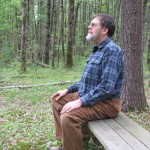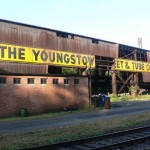One of my fears in starting this blog was that I will eventually find myself under attack by either certain Pagans or certain Quakers who find it objectionable that I self-identify as a member of both groups. I think I’m more afraid of this coming from the Quaker side of the aisle, actually–probably because, having been a Pagan in some sense for most of my life, and in a formal sense for twenty years, I feel pretty comfortable in that identity. I’ve been around long enough, and accepted by enough men and women I deeply respect long enough, that I have no worries about being denied the keys to that particular castle.
With Quakers, I’m a little more sensitive.
Early on in my convincement process (to use the Quakerese) I posted some of my thoughts on it on an earlier website I owned, and joined a Quaker web ring. All was well for a while, until one day my link to the ring simply failed to function. When I contacted the owner of the ring for tech support, I learned that, by decision of the members of the ring, I had been expelled from the group. At least one group, in fact, threatened to cecede from the ring were I not expelled. I could not, it was explained to me, be both Quaker and Pagan at the same time. So it was not proper for me to be a member of that ring, nor of a Quaker meeting.
I found the process very painful. It made me skittish about applying for membership in my meeting for quite some time–not really a bad thing, I guess, as it made me take a more careful look at my motivations, and urged me to work as deeply as I could with my clearness committee, when I did apply. I hope I’ve moved on, and I hope I’m not unjust or distorted in how I remember the events. But it feels very sweet to me to read words like those of James Riemermann, a non-theist Friend, who writes:
“Some might also take this as a rejection of Christians or Christianity in my vision of liberal Quakerism. It is not. It is a rejection of the notion that Christians (or theists, for that matter) are exclusively entitled to define us as a religious society, or that we should be centrally concerned with how to distinguish ourselves from everyone who is not a Quaker.
“What defines Quakerism for me is, the people I sit with in worship. When someone new comes in and sits with us, they redefine Quakerism, immediately and without effort. A Quaker is one who shows up and takes part. To me this is breathtaking, that we can have the courage to be that open.”
That everyone in meeting is part of meeting, is part of the definition of it, each time they worship in that unique Quaker way… that is my experience, too. And it’s why, without being Christian, I can honestly celebrate the Christianity of other members of my meeting. When a member of my meeting finds a spiritual deepening in the Bible, and shares that in spoken ministry, I am graced by it even if I am not especially enamored of the spark that kindled that Light. I don’t need to be Christian to have my own spiritual life deepened by the deepening Christianity of the Christ-centered Quakers around me. I can feel it in my roots, in my belly, in my heart. As in the story of John Woolman among the indians, “I love to listen to where the words come from.”











